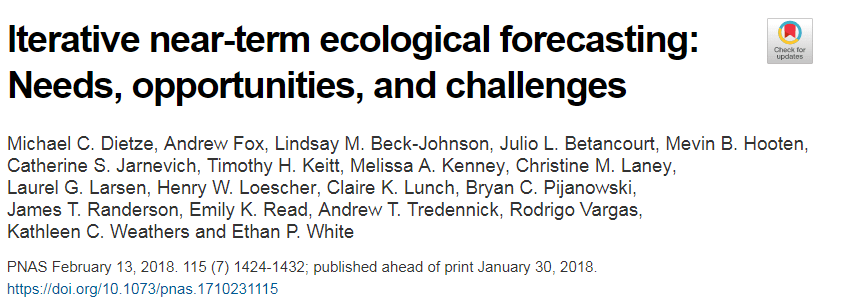We live on a non-stationary, unreplicated planet that is rapidly moving outside the envelope of natural variability. In this world the essential ecological questions are “How are ecosystems and the services they provide going to change in the future?” and “How do human decisions affect this trajectory?” These are fundamentally questions about ecological forecasting.
There is a mismatch between most ecological forecasts, which are focused on centennial-scale climate change responses, and environmental decision-making, which tends to be focused on the near-term. In this project (Near-term Ecological Forecasting Initiative, NEFI) researchers at Boston University and the Cary Institute are working to develop an iteratively cycle between making forecasts, performing analyses, and updating predictions in light of new evidence. Research across widely disparate disciplines
has shown that this iterative process of gaining feedback, building experience, and correcting models and methods is critical for building a forecast capacity. Iterative forecasting is also a crucial part of any decision making under high uncertainty and the cornerstone of adaptive management.
In addition to making ecology more relevant to management, near-term forecasts will routinely compare specific, quantitative predictions to new data, which is one of the strongest tests of any scientific theory. This approach will be applied to a broad spectrum of ecological variables: leaf phenology, land carbon and energy fluxes, tick-borne disease, small-mammal populations, aquatic productivity, and soil microbial diversity and function. By taking a broad, comparative approach we will address cross-cutting hypotheses about the nature of predictability in ecology and develop an overarching body of forecasting theory and methods.
We will be focused on four key application areas:
I. Terrestrial land surface fluxes and phenology:
Dr. Michael Dietze, Associate Professor at BU
Kathryn Wheeler, Ph.D. student at BU
II. Tick-borne disease and rodent reservoirs:
Dr. Shannon LaDeau, Disease Ecologist at Cary
Dr. Michael Dietze, Associate Professor at BU
John Foster, Ph.D. student at BU
III. Aquatic Productivity
Dr. Kathleen Weathers, Ecosystem Ecologist at Cary
IV. Soil Microbial Communities
Dr. Jennifer Talbot, Assistant Professor at BU
Dr. Colin Averill, Post-doc at BU
Stay tuned for more information and forecasts!

